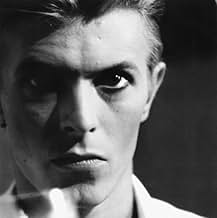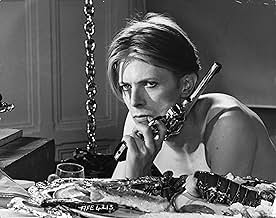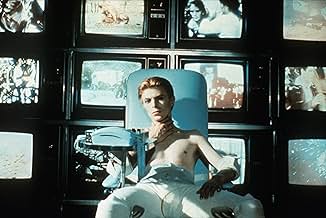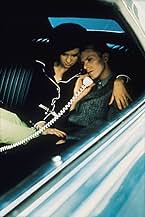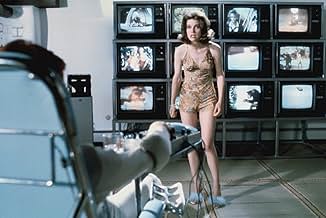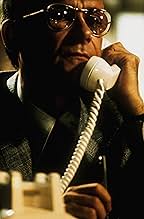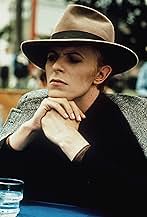CALIFICACIÓN DE IMDb
6.6/10
30 k
TU CALIFICACIÓN
Un extraterrestre debe hacerse pasar por ser humano para salvar su planeta moribundo, pero una mujer y la codicia de otros hombres se lo pondrán difícil.Un extraterrestre debe hacerse pasar por ser humano para salvar su planeta moribundo, pero una mujer y la codicia de otros hombres se lo pondrán difícil.Un extraterrestre debe hacerse pasar por ser humano para salvar su planeta moribundo, pero una mujer y la codicia de otros hombres se lo pondrán difícil.
- Dirección
- Guionistas
- Elenco
- Premios
- 1 premio ganado y 4 nominaciones en total
Jim Lovell
- Capt. James Lovell, Commander of Apollo 13
- (as Capt. James Lovell)
Dort Clark
- Waiter
- (sin créditos)
- Dirección
- Guionistas
- Todo el elenco y el equipo
- Producción, taquilla y más en IMDbPro
Opiniones destacadas
Maybe Starman David Bowie was born to play the title role in The Man Who Fell To Earth, an avant-garde disjointed sci fi film from director Nicolas Roeg.
Thomas Jerome Newton (David Bowie) is an alien who lands in New Mexico with some precious rings, a British passport and some rudimentary knowledge of patents. He needs to make money so he can build a rocket ship that can transport water to his dying planet.
Newton quickly makes money through his advanced business patents, he recruits a chief scientist (Rip Torn) who discovers that he is not what he appears to be and falls in love with hotel maid (Candy Clark) who also introduces him to the delights of gin & tonic.
The government intelligence service and rival businesses decide to look closely into his activities. They throw his patent lawyer and business associate (Buck Henry) out of the window and then hold Newton captive in a hotel plying him with gin.
The film plays with time as years go by and other characters age. We have flashbacks of Newton in his home planet with his family. The most memorable scenes is that of an alien with a British passport and the famous scene of Clark urinating her underwear when Newton reveals himself as an alien.
The film has a cult following but it is not a great film. It is too trippy and unstructured leading you to ask more questions than get any answers from it. Still I cannot think of anyone else who could had played the title role in that era and Bowie goes for it full frontal.
However the combination of Bowie and Roeg makes this a landmark science fiction film of the 1970s just as worthy as Close Encounters of the Third Kind.
Thomas Jerome Newton (David Bowie) is an alien who lands in New Mexico with some precious rings, a British passport and some rudimentary knowledge of patents. He needs to make money so he can build a rocket ship that can transport water to his dying planet.
Newton quickly makes money through his advanced business patents, he recruits a chief scientist (Rip Torn) who discovers that he is not what he appears to be and falls in love with hotel maid (Candy Clark) who also introduces him to the delights of gin & tonic.
The government intelligence service and rival businesses decide to look closely into his activities. They throw his patent lawyer and business associate (Buck Henry) out of the window and then hold Newton captive in a hotel plying him with gin.
The film plays with time as years go by and other characters age. We have flashbacks of Newton in his home planet with his family. The most memorable scenes is that of an alien with a British passport and the famous scene of Clark urinating her underwear when Newton reveals himself as an alien.
The film has a cult following but it is not a great film. It is too trippy and unstructured leading you to ask more questions than get any answers from it. Still I cannot think of anyone else who could had played the title role in that era and Bowie goes for it full frontal.
However the combination of Bowie and Roeg makes this a landmark science fiction film of the 1970s just as worthy as Close Encounters of the Third Kind.
The Man Who Fell To Earth is ultimately a frustrating film. The phrase 'the sum of its parts is greater than the whole' definitely applies. At times it's brilliant and original, but it's effectively brought down by its overlong running time and relentlessly obtuse presentation. It begins very promisingly but falls away in the final third, where it just loses focus and direction. Visually, as can be expected from Nicolas Roeg, it's often quite excellent, with his usual bold editing techniques in place too. The cinematography is very good and David Bowie certainly looks the part. Roeg certainly had a thing for using singers in lead roles. He also utilized Mick Jagger in Performance and Art Garfunkel in Bad Timing, and Bowie like those other two is used to good effect. He doesn't really need to act very much; Bowie in the mid 70's was an almost alien-like creature to begin with. I thought Candy Clark was very good as Mary-Lou. She brought some warmth to the proceedings which was appreciated.
Like Roeg's work in general, there is hardly any humour here. He was primarily a visionary auteur and The Man Who Fell To Earth is undoubtedly a work that allows him to express himself in a highly personal way. But unlike in Performance, Walkabout, Don't Look Now and even Bad Timing the technique never seemed to achieve an overall whole. My feeling is that I would need to re-watch this movie in order to develop a better appreciation of it. On first impressions, it's a collection of great moments within an impenetrable whole. A very strange film though.
Like Roeg's work in general, there is hardly any humour here. He was primarily a visionary auteur and The Man Who Fell To Earth is undoubtedly a work that allows him to express himself in a highly personal way. But unlike in Performance, Walkabout, Don't Look Now and even Bad Timing the technique never seemed to achieve an overall whole. My feeling is that I would need to re-watch this movie in order to develop a better appreciation of it. On first impressions, it's a collection of great moments within an impenetrable whole. A very strange film though.
Nicholas Roeg is a little tricky at times when it comes to narrative. Sometimes he experiments with it excellently (Bad Timing), and other times he slightly dulls the senses in an experimental kind of way (Dont Look Now). The Man Who Fell to Earth seems to be told mostly in a linear fashion, and there seems to be something of a story going on, but... I never felt it completely click. Maybe that is part of Roeg's point with the material, to create a kind of alienation that the alien, no pun intended, feels whilst gathering up the billions he needs to get supplies back to his home planet. But something just doesn't feel like it goes the way it should, even when things are fascinating in a scene, maybe even brilliant, and the actors do end up trying their best along with Roeg's knack at capturing a mood in a specific, strange but bewildering way.
It isn't totally clear where the plot could be headed, aside from the usual oblivion of the protagonist to the wretched TV, excess of alcohol, and some drugs to boot. Which is fine as a route of a plot. But it's perhaps that there doesn't seem to be a sharper satirical stabbing motion being made in the context of the story, of what Bowie's "man" is doing on Earth, except in bits and pieces. Perhaps he's a reflection of how some of us act right here on our planet, or that there's even a sorrow to the state of affairs with Thomas Newton, who is sensitive, sometimes weak, and at least a little unnerving in his detachment via the almighty dollar. Maybe there are some valid points made in connection with the suffering of a human being, in what it does to his soul the longer they're on some strange planet, by way of a horrible and dehumanizing marketplace. But the way it's presented, to once again pop up a word that gets tossed like a beach ball at a concert, in a pretentious manner.
Or, to amend that with another tired cliché: the parts are better than the sum or the whole. I did enjoy very much just looking at the Man Who Fell to Earth, with some scenes, some shots, some transitions, some jabs at "real" cinema, displaying Roeg's natural gifts as an auteur at the peak of his powers. Just seeing that New York skyline, for instance, is a minor thrill, or in the cutbacks Newton has to his old world. Hell, even the sex scenes, much lauded in some of the more negative reviews, have a certain messy charm to them. And who doesn't love seeing Rip Torn as some smart but dangerous scientist who moves on from a penchant for young students in the sack to Newton's possible rocket-ship? Seeing scenes with Bowie and Rip Torn are, indeed, exciting in their indescribable link (Bowie, of course, so fits into Newton it's hard to figure anyone else in the part). I even loved the quirky, old rock and roll/jazz type of music Roeg used, when the first assumption would be Bowie would glam-rock the whole place up.
If there's anything that keeps the Man Who Fell to Earth from being a truly spectacular cult item though, if only for this reviewer, it's a certain mood overall to the piece, an uncertainty as to what to do with everything in the book and how to make it so unusual a piece of science fiction that its own alienation could potentially affect the viewer in unexpected ways. It's got guts to go where it does, to be sure, but it's a tough journey along the way, with romance, wonderment of the unknown, mental deconstruction, and corporate fables all entwined. Whatever you have to say about it there's nothing else like it.
It isn't totally clear where the plot could be headed, aside from the usual oblivion of the protagonist to the wretched TV, excess of alcohol, and some drugs to boot. Which is fine as a route of a plot. But it's perhaps that there doesn't seem to be a sharper satirical stabbing motion being made in the context of the story, of what Bowie's "man" is doing on Earth, except in bits and pieces. Perhaps he's a reflection of how some of us act right here on our planet, or that there's even a sorrow to the state of affairs with Thomas Newton, who is sensitive, sometimes weak, and at least a little unnerving in his detachment via the almighty dollar. Maybe there are some valid points made in connection with the suffering of a human being, in what it does to his soul the longer they're on some strange planet, by way of a horrible and dehumanizing marketplace. But the way it's presented, to once again pop up a word that gets tossed like a beach ball at a concert, in a pretentious manner.
Or, to amend that with another tired cliché: the parts are better than the sum or the whole. I did enjoy very much just looking at the Man Who Fell to Earth, with some scenes, some shots, some transitions, some jabs at "real" cinema, displaying Roeg's natural gifts as an auteur at the peak of his powers. Just seeing that New York skyline, for instance, is a minor thrill, or in the cutbacks Newton has to his old world. Hell, even the sex scenes, much lauded in some of the more negative reviews, have a certain messy charm to them. And who doesn't love seeing Rip Torn as some smart but dangerous scientist who moves on from a penchant for young students in the sack to Newton's possible rocket-ship? Seeing scenes with Bowie and Rip Torn are, indeed, exciting in their indescribable link (Bowie, of course, so fits into Newton it's hard to figure anyone else in the part). I even loved the quirky, old rock and roll/jazz type of music Roeg used, when the first assumption would be Bowie would glam-rock the whole place up.
If there's anything that keeps the Man Who Fell to Earth from being a truly spectacular cult item though, if only for this reviewer, it's a certain mood overall to the piece, an uncertainty as to what to do with everything in the book and how to make it so unusual a piece of science fiction that its own alienation could potentially affect the viewer in unexpected ways. It's got guts to go where it does, to be sure, but it's a tough journey along the way, with romance, wonderment of the unknown, mental deconstruction, and corporate fables all entwined. Whatever you have to say about it there's nothing else like it.
This movie is definitely one of my favourites. First off, the acting is wonderful. David Bowie is awesome, I could not have imagined a better choice of actor. He plays his role to perfection and with just the right emotion. Candy Clark is also incredible in her role. Then comes the plot itself. Sure the plot is a little hard to follow but it is so brilliantly rendered and the cinematography is perfect. A very strong atmosphere and mood is created and the whole thing all together is just mind-blowing. Very original. Very artistic. Go see it if you haven't already.
I would also like to add that this cult science fiction film is however not for everyone. The way it was created and the way the scenes are shot resembles an experimental film. The style is also out of the ordinary and the plot may seem to be a little strange and confusing to some. Most people either love it or hate it.
I would also like to add that this cult science fiction film is however not for everyone. The way it was created and the way the scenes are shot resembles an experimental film. The style is also out of the ordinary and the plot may seem to be a little strange and confusing to some. Most people either love it or hate it.
so, it seems to me there have been a lot of negative reviews. they break down into two categories: 1) those that say its got "too much sex". blah. grow up. 2) those who say "it's a mess". okay...we can work with that.
this really isnt a plot-based scifi like Star Wars. its not about linear events with obvious cause-and-effects, good guys and bad. its part scifi, part art film, and part trippy 70s movie. these movies dont speak with dialogue, they speak with images, and with mood (ie, "How does this sequence make you feel?" warm? uncomfortable? etc) thats just what this movie is. if you dont like these types of movies--movies in which you may have to do some interpretation--you wont like this one either. simple. its not Star Wars, people...Lucas isnt here to hold your hand.
for instance, one of the "gratuitous" sex scenes near the end, after Mary Lou has aged, was not gratuitous but in fact grotesque. it made me uncomfortable. which i am certain is exactly what it was supposed to do--to show me what a sham Newton's relationship with Mary Lou had become. it had become merely a drunken-memory, for them both... and their sex-scene-revisited depicted that, perfectly.
the whole movie is like that, speaking in general feelings and mood rather than black-and-white dialogue. and its more powerful because of it.
so...put it in perspective as you critic it. dont like romantic comedies? then youre not gonna like the latest Hugh Grant film. but that doesnt mean it isnt good. capese? (btw, i think hugh grant movies suck).
this really isnt a plot-based scifi like Star Wars. its not about linear events with obvious cause-and-effects, good guys and bad. its part scifi, part art film, and part trippy 70s movie. these movies dont speak with dialogue, they speak with images, and with mood (ie, "How does this sequence make you feel?" warm? uncomfortable? etc) thats just what this movie is. if you dont like these types of movies--movies in which you may have to do some interpretation--you wont like this one either. simple. its not Star Wars, people...Lucas isnt here to hold your hand.
for instance, one of the "gratuitous" sex scenes near the end, after Mary Lou has aged, was not gratuitous but in fact grotesque. it made me uncomfortable. which i am certain is exactly what it was supposed to do--to show me what a sham Newton's relationship with Mary Lou had become. it had become merely a drunken-memory, for them both... and their sex-scene-revisited depicted that, perfectly.
the whole movie is like that, speaking in general feelings and mood rather than black-and-white dialogue. and its more powerful because of it.
so...put it in perspective as you critic it. dont like romantic comedies? then youre not gonna like the latest Hugh Grant film. but that doesnt mean it isnt good. capese? (btw, i think hugh grant movies suck).
¿Sabías que…?
- TriviaThe picture was temporarily scored with music from Pink Floyd's album "The Dark Side of the Moon".
- ErroresWhen Mary-Lou takes Thomas to the hotel's fifth floor in the elevator instead of allowing him to use the stairs, she says, "It's five flights." This would be correct in the UK, but not in America; from the ground floor to the fifth floor of an American building is four flights.
- Citas
Thomas Jerome Newton: Ask me...
Nathan Bryce: What?
Thomas Jerome Newton: The question you've been wanting to ask ever since we met.
Nathan Bryce: Are you Lithuanian?
Thomas Jerome Newton: [grins] I come from England.
Nathan Bryce: Ah, that's not so terrible.
- Versiones alternativasThe US theatrical release of the film was drastically altered. Not only were 20 minutes cut (including the gun sequence) but some scenes were rearranged and a few scenes had different camera angles.
- ConexionesEdited into We are the Robots (2010)
Selecciones populares
Inicia sesión para calificar y agrega a la lista de videos para obtener recomendaciones personalizadas
- How long is The Man Who Fell to Earth?Con tecnología de Alexa
Detalles
- Fecha de lanzamiento
- País de origen
- Idioma
- También se conoce como
- The Man Who Fell to Earth
- Locaciones de filmación
- Productoras
- Ver más créditos de la compañía en IMDbPro
Taquilla
- Presupuesto
- USD 1,500,000 (estimado)
- Total en EE. UU. y Canadá
- USD 100,072
- Fin de semana de estreno en EE. UU. y Canadá
- USD 5,922
- 26 jun 2011
- Total a nivel mundial
- USD 167,072
- Tiempo de ejecución
- 2h 19min(139 min)
- Color
- Mezcla de sonido
- Relación de aspecto
- 2.35 : 1
Contribuir a esta página
Sugiere una edición o agrega el contenido que falta



